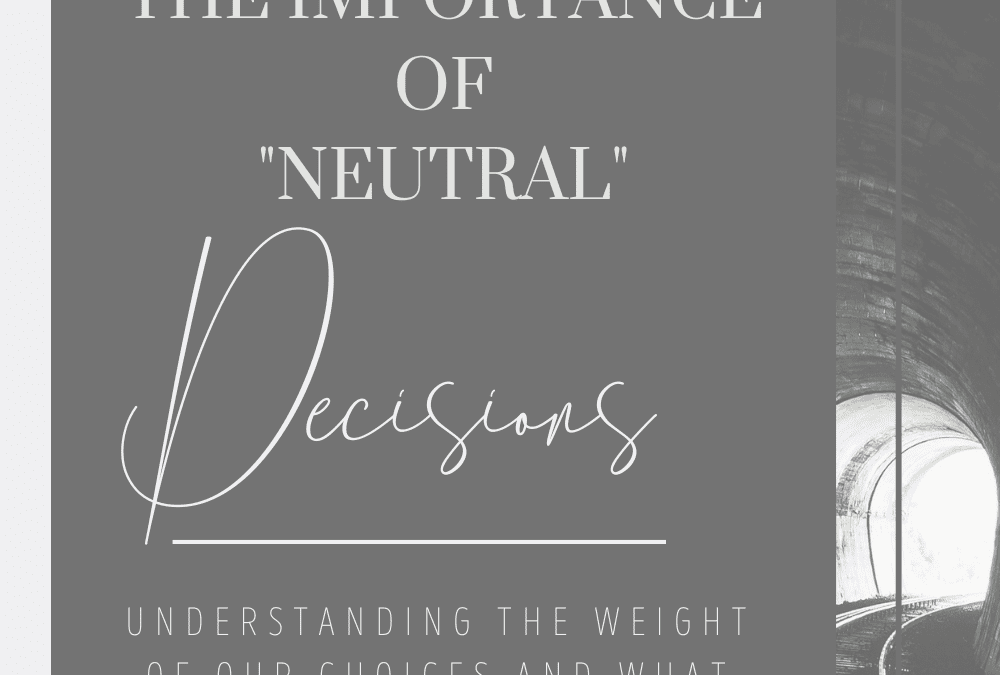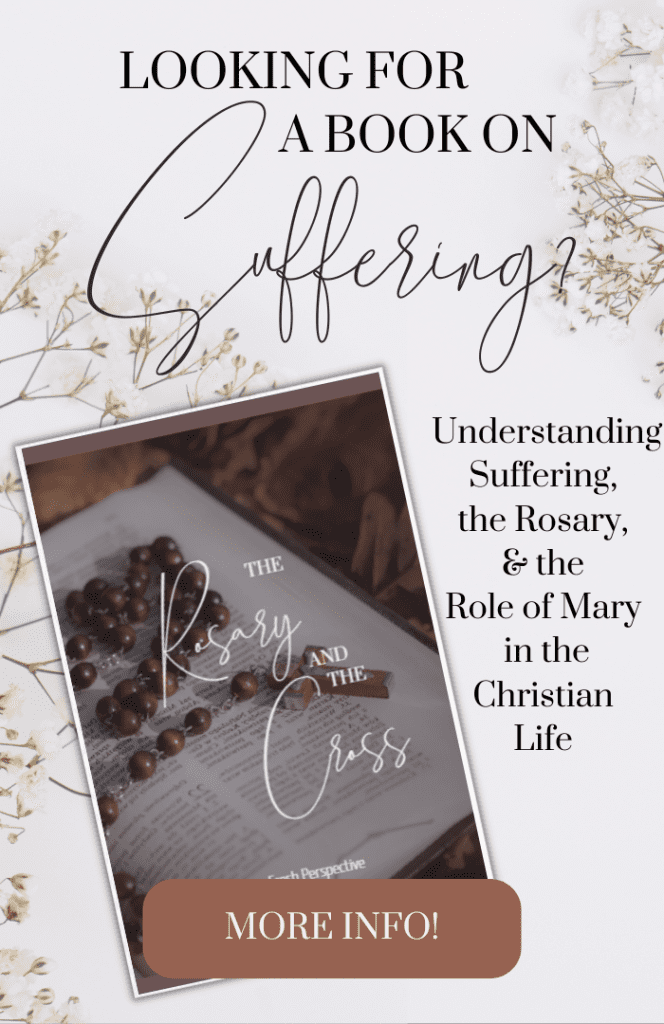I hate decision making. I am basically the posterchild for Emily P. Freeman’s target audience. The weight of the responsibility of choice is, and I’m afraid will ever remain, paralyzing to me. My decisions are usually based on a desirable consequence I envision about 10-12 steps beyond the present situation. But, what happens when I am faced with apparently neutral decisions, ones I can’t envisions the consequences for, or ones that affect other people? The problem that eats me alive is, how can there be situations where “it doesn’t matter what I choose”, but in the end my choice matters? How is it fair that I could end up with negative consequences for choices that were technically “permissible”?
It used to make me sooo angry. How can you make a “bad” choice if there really was no clearly wrong option? I hate being free to make “bad” choices! Why can’t the right answer just be a little more obvious and a little less optional?
After 6 months of wrestling with this notion, answers are starting to surface.
Freedom is all about how we use our will.
We use our will to make choices. Our choices proclaim who we are to the world, and to God. Incidentally, this is why surrendering our will to God is often called “slavery”, because it is total and complete self-gift. But, paradoxically enough, this surrender of our will is ALSO how we become free, at least in the sense of going back to the freedom of the Garden where we are free from the weight of this eternal decision making, of trying to be “like God” in controlling all our circumstances (Genesis 3:5).
But, if we have fully surrendered our will to Him, how come He doesn’t always tell us what to do? Not every choice is governed by law. Why does He still give us options?
Because our choice for Him must remain free.
It’s not a once and done thing. We are still FREE in Heaven! We just have no circumstances left in which we would ever choose against God. We’ve experienced them all, already made our choice. Already chosen Him. Freely.
Lord, You have proved me and you know me – Psalm 139:1
Every moment we are on this earth, we are still in the process of developing ourselves, deciding who we are and who we want to be. If we are alive, we still have the choice to choose Him or choose against Him. That’s the essence of the purpose of this life: Do we choose Him or not?
Because that’s all Heaven is, that’s all Holiness consists of, union with God.
If we do not desire God, then the truth is that we do not desire Heaven.
We MUST ask ourselves two questions:
- What do we live for?
- What do we run to?
We must be super honest here with ourselves. Get down to the nitty gritty brass tacks. Complete and total, naked truth. If the answer to these two questions isn’t God… then we have an idol problem.
Most of the time the answers to these questions are our addictions. We live for our families, our pets, our comfort, and we run to entertainment, food, sleep, and caffeine to cope (on a good day). (We will just pretend none of us have “worse” problems like alcohol, drugs, violence, sex, etc…)
The first and greatest commandment is:
You shall love the Lord your God with all your heart, with all your soul, with all your mind, and with all your strength. – Mark 12:30
Can we really say we do this?
Do we really love Him?
Do we long for Him, “like a hind that pants for running water” (Psalm 42:1)? Does my soul “yearn and pine for the living God (Psalm 84:2)”? Is He the reason behind all my decisions and all my actions?
Back in the day, life was desperately hard. Death was commonplace (the average life expectancy used to be only about 35 years old), and the need for God more visible and prevalent. With the advent of all our gadgets and comforts, with all our industrialization of food, comfy mattresses, and medicine, we’ve lost our realization of our need for Him. With the loss of our recognition of our need for God came the advent of atheism, but before this everyone knew God as real, because He literally sustained their every moment, their every breath.
This is why it is so hard to get to heaven. It isn’t good enough to do the right thing and avoid the wrong thing. That’s the Pharisees. Their rules “tie up heavy burdens hard to carry and lay them on people’s shoulders” (Matthew 23:4). No, we also have to do it for the right reasons!!! This is what it means to love God and have our actions flow from this love.
This is what it means to seek God, above all else (Matthew 6:33).
Seeking is an active thing, it must be chosen. It must be pursued. It requires the WILL.
Every choice must be made in the light of choosing God. This is why we must choose based on what would bring us closer to God, or what He thinks of our choices, rather than making choices based on what our spouse (or our boss, or child, or friend) wants, or what other people think of our choices, not even what we think of our choices.
Who do we want to be?
Do we want to be His?
Or do we want to belong to anything/everything else? I do not have to be a slave to my desire for sugar, for pity, for comfort, for caffeine.
No one can serve two masters – Matthew 6:24
This is why in Lent we give up the things we run to in order to teach ourselves to run to God, to learn to trust God, to discover that God is capable of satisfying all our needs, AND all our desires.
Some people say, “Don’t mortify things that mortify others”… and I agree with this to a degree, because obviously we shouldn’t just give up coffee in order to justify being cruel to our family and grouchy to our neighbors, and ESPECIALLY not to get pity and show off how “holy” we are by doing something that makes us absolutely miserable. BUT, if the attitude we take toward what we “give up” is that we are SEEEKING GOD to take the place of that thing, Only then does our asceticism not create a vortex in our lives – a vortex that would inevitably fill with any number of other equally negative addictions, or make us absolutely miserable – it is about running TOWARD something, or rather someOne. So, to me, this very saying – “don’t mortify things that mortify others” – is missing the target. If we don’t attack the actual problem areas, they will continue to remain a problem. We don’t mortify ourselves to mortify anything really. All we are doing is intentionally rearranging our priorities so that things are put back in right order, intentionally fostering an enhanced desire for God.
But, this intentional fostering of our desire for God should never be limited to Lent alone! How sad would that be??!?! Pretty sure our earthly relationships would suffer if we only paid attention to them at Valentine’s day, How much sense does it make to only foster our relationship with God at Easter?? Would you marry someone who only pursued your heart when someone else told them to?
We will never develop our own relationship with God if we only pursue Him when external circumstances require it.
It will never become our own until we go above and beyond to CHOOSE HIM when we don’t HAVE to.
We have the freedom. We CAN make “neutral choices”. We can choose comfort food or healthy food. We can choose to fritter away our lives in lounging, sleep, or entertainment. They are not “inherently or obviously evil” but they do make statements about who we are, they DO affect us. There is no law about whether I should choose to spend time with my spouse or loose myself to my phone. There is no hard and fast rule to tell us how we must educate our children, or how often we should read our Bibles or attend Church (ie. above and beyond Sundays). BUT, our choices matter, they say things about who we are and who we want to be.
I used to think it wasn’t fair for it to be a free choice if it mattered so much… but now I realize that only genuinely free choices present me with this opportunity to choose who I want to be. I choose God because I love God, no other reason. These are the choices where it matters most. Here we find out who we are.
Blessed is the man that is found without blemish, and that hath not gone after gold, nor put his trust in money or in treasures. Who is he, and we will praise him? For he hath done wonderful things in this life. Who hath been tried thereby, and made perfect, he shall have glory everlasting: he that could have transgressed, and hath not transgressed, and could do evil things and hath not done them; therefore are his goods established in the Lord, and all the church of the saints shall declare his alms. – Ecclesiasticus 31:8-11


